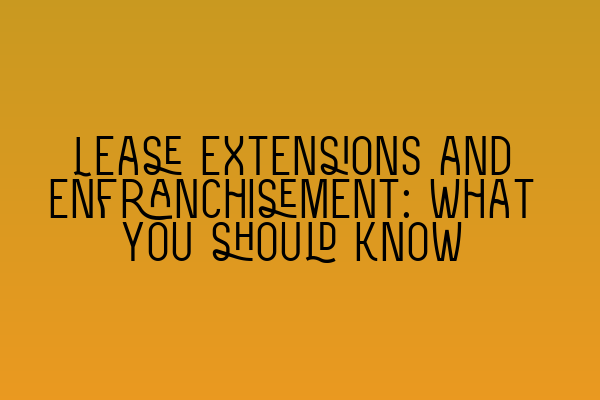Lease Extensions and Enfranchisement: What You Should Know
As a property owner, it is crucial to have a good understanding of lease extensions and enfranchisement. These legal processes can have a significant impact on the value, management, and long-term prospects of your property. In this article, we will break down the key aspects of lease extensions and enfranchisement, providing you with the necessary knowledge to make informed decisions.
What is a Lease Extension?
A lease extension is the process of extending the term of a lease. In most cases, lease extensions are sought by tenants who wish to prolong their lease beyond its original term. This is particularly common for leasehold properties, where the landlord owns the land but the tenant has a long-term lease on the property.
Lease extensions are governed by specific legislation, which outlines the rights and responsibilities of both the landlord and the tenant. One of the key rights granted to tenants under this legislation is that they have the right to request a lease extension from their landlord, provided they meet certain eligibility criteria.
Eligibility for Lease Extension
To be eligible for a lease extension, tenants must meet the following criteria:
1. The property must be held under a long lease, usually with an initial term of more than 21 years.
2. The tenant must have owned the leasehold interest in the property for at least two years.
3. The property must not be used for non-residential purposes.
If you meet these eligibility criteria, you have the right to serve a formal notice on your landlord, requesting a lease extension. It is important to note that there are strict time limits for initiating the lease extension process, so it is advisable to seek legal advice promptly.
Lease Extension Valuation
When extending a lease, the leasehold valuation is an important consideration. The lease extension valuation determines the premium that the tenant will have to pay to the landlord in exchange for the extended lease.
The valuation process can be complex, taking into account factors such as the remaining term of the lease, the property’s market value, and the level of ground rent. It is recommended to appoint a professional surveyor or valuer with experience in leasehold properties to ensure an accurate valuation.
Enfranchisement: Buying the Freehold
Enfranchisement refers to the process of buying the freehold of a leasehold property. This allows the leasehold tenants to own both the property and the land on which it stands, giving them greater control and potentially increasing the property’s value.
Enfranchisement is governed by specific legislation, known as the Leasehold Reform Act 1967 and the Leasehold Reform, Housing, and Urban Development Act 1993. These acts grant certain rights to leasehold tenants, including the right to collective enfranchisement.
Collective Enfranchisement
Collective enfranchisement enables leasehold tenants in a building or estate to come together and collectively purchase the freehold from the landlord. To qualify for collective enfranchisement, the following criteria must be met:
1. The building or estate must contain at least two flats.
2. At least two-thirds of the flats must be owned by qualifying leaseholders (i.e., tenants who meet specific eligibility criteria).
3. The leaseholders must form a company to facilitate the purchase.
By collectively enfranchising, leasehold tenants gain control over the management and maintenance of the building and can extend their leases without having to pay a separate lease extension premium.
Seeking Professional Advice
Lease extensions and enfranchisement can be complex legal processes, and it is advisable to seek professional advice to navigate them effectively. A solicitor specializing in property law can guide you through the process, ensuring that your rights are protected and that you achieve the best possible outcome.
At SQE Property Law & Land Law, our team of expert solicitors have extensive experience in lease extensions and enfranchisement. We can provide you with the necessary guidance and support to ensure a smooth and successful process. Contact us today to discuss your lease extension or enfranchisement needs.
In conclusion, lease extensions and enfranchisement are critical aspects of property law that all property owners should be familiar with. Understanding the rights and processes involved in lease extensions and enfranchisement allows you to protect the value of your property and make informed decisions about its future. Seek professional advice to ensure that you navigate these processes effectively and achieve the best possible outcomes.
Learn more about property law and land law in our related articles:
– SQE 1 Practice Exam Questions
– SQE 1 Practice Mocks FLK1 FLK2
– SQE 2 Preparation Courses
– SQE 1 Preparation Courses
– SRA SQE Exam Dates
